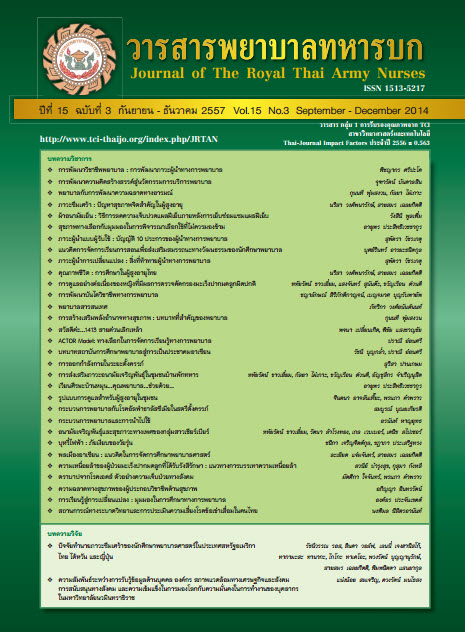แนวคิดการจัดการเรียนการสอนเพื่อส่งเสริมสมรรถนะทางวัฒนธรรมของนักศึกษาพยาบาล Instructional Approach for Enhancing Cultural Competence of Nursing Students
Keywords:
สมรรถนะทางวัฒนธรรม, แนวคิดการจัดการเรียนการสอน, นักศึกษาพยาบาล, cultural competence, instructional approach, nursing studentAbstract
สมรรถนะทางวัฒนธรรม คือความสามารถซึ่งเป็นผลรวมของความรู้ ทัศนคติ และทักษะการปฏิบัติของพยาบาลในการดูแลผู้รับบริการบนพื้นฐานทางวัฒนธรรมของผู้รับบริการ ประกอบด้วย ความตระหนักทางวัฒนธรรม ความรู้เกี่ยวกับวัฒนธรรม ทักษะการประเมินทางวัฒนธรรม การมีปฏิสัมพันธ์ทางวัฒนธรรม และทักษะการดูแลบนพื้นฐานทางวัฒนธรรม สมรรถนะทางวัฒนธรรมเป็นสิ่งสำคัญจำเป็นในโลกปัจจุบัน ดังนั้น นักศึกษาพยาบาลจึงควรได้รับพัฒนาสมรรถนะทางวัฒนธรรม เพื่อเป็นการเตรียมความพร้อมสำหรับการปฏิบัติงานในอนาคต การจัดการเรียนการสอนตามแนวคิดการเรียนรู้ผ่านประสบการณ์และแนวคิดคุณลักษณศึกษา สามารถนำมาใช้ในการจัดการเรียนการสอนเพื่อส่งเสริมสมรรถนะทางวัฒนธรรม โดยผู้เรียนสร้างความรู้และคุณลักษณะที่พึงประสงค์ผ่านการลงมือปฏิบัติ การสะท้อนคิด การกำหนดคุณลักษณะ การสร้างมโนทัศน์ใหม่ และการนำไปทดลองปฏิบัติCultural competence is the ability including knowledge, attitude and skills of nurses who provide health care based on cultural background of an individual. Cultural competence consist of cultural awareness, cultural knowledge, cultural assessment skills, cultural encounter, and cultural care skills. There are a lot of changes in the world, recently that is why nursing students need to be prepared to work effectively. Instructional approach which come from experiential learning approach and character education approach can enhance cultural competence of nursing students. The process of this instructional approach include having experience, reflcting on the experience, defiing character, constructing new concept, and planning into practice.
Downloads
Downloads
How to Cite
Issue
Section
License
บทความหรือข้อคิดเห็นใดใดที่ปรากฏในวารสารพยาบาลทหารบกเป็นวรรณกรรมของผู้เขียน ซึ่งบรรณาธิการหรือสมาคมพยาบาลทหารบก ไม่จำเป็นต้องเห็นด้วย
บทความที่ได้รับการตีพิมพ์เป็นลิขสิทธิ์ของวารสารพยาบาลทหารบก
The ideas and opinions expressed in the Journal of The Royal Thai Army Nurses are those of the authors and not necessarily those
of the editor or Royal Thai Army Nurses Association.






